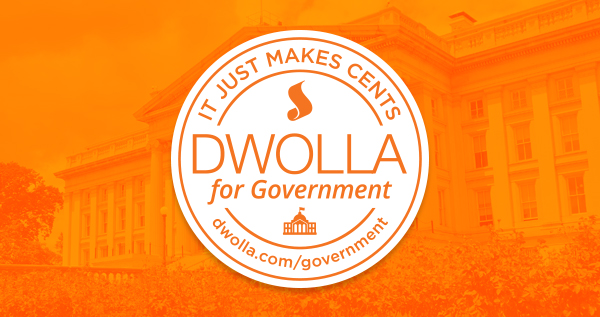payments
Announcement: Dwolla partnership U.S. Treasury
February 19, 2015Company Announcement
Dwolla to help U.S. Treasury go paperless, prepare for a secure digital future
 Each year the The U.S. Department of the Treasury’s Bureau of the Fiscal Service collects 400 million transactions worth $3.7 trillion. Ensuring that its collection programs stay relevant, safe, and cost-effective, they recently launched a new Digital Wallet program. The new initiative aims to modernize the way our country collects and distributes payments through the convenient offering of safe and innovative payment options. In June of 2013, the Digital Wallet initiative issued a request for proposal, asking national payment platforms to help the 225-year-old Treasury Department improve its flagship revenue collections product, Pay.Gov.
Each year the The U.S. Department of the Treasury’s Bureau of the Fiscal Service collects 400 million transactions worth $3.7 trillion. Ensuring that its collection programs stay relevant, safe, and cost-effective, they recently launched a new Digital Wallet program. The new initiative aims to modernize the way our country collects and distributes payments through the convenient offering of safe and innovative payment options. In June of 2013, the Digital Wallet initiative issued a request for proposal, asking national payment platforms to help the 225-year-old Treasury Department improve its flagship revenue collections product, Pay.Gov.
With existing partnerships with Microsoft Government and state administrations, Dwolla’s flexible architecture makes for an ideal partner in helping modernize public payments. Today, we’re excited to announce our selection as the U.S. Treasury’s first Digital Wallet partners, alongside PayPal (and ApplePay).
What is Pay.Gov? It’s smart government.
Nearly 200 federal agencies, ranging from the Department of Interior to the Department of Defense, use the U.S. Treasury’s Pay.gov platform to create and host custom online payment forms, collecting over 100 million transactions worth approximately $110 billion per year. These simple forms, which hide a sophisticated software and accounting system, allow federal agencies to collect and track non-income tax payments for things like climbing Denali or court fees. It’s a lot like Dwolla Forms, but made exclusively for the federal government.
By outsourcing their revenue collection needs to Pay.Gov, federal agencies not only provide taxpayers an improved experience but also streamline their own payment operations. In doing this, they reduce the operational costs, inefficiencies, and foregone payments. Simply put, Pay.Gov increases revenue for agencies and saves taxpayers money.
How is Dwolla involved? How would this impact me?
Dwolla is now a live payment option for many US agencies (and this will grow over time)–allowing any taxpayer with a U.S. bank or credit union account to use Dwolla’s simple and secure online checkout experience to pay for a whole host of federal fees, products, and permits.
No cards. No checks. No pre-existing Dwolla account required. No sharing of sensitive payment information with the federal government.
What is Dwolla? A secure and modern way to make bank transfers.
When we began building the Dwolla payment network in 2008, we set out to create the ideal way to send money. What we quickly found is that the ideal way to move money has changed since the 1960s and 70s, and the only way to solve the problem was to start over.
Starting fresh with over 40 years of technological advancements, Dwolla was able to create an end-to-end payment network that modernized the legacy bank systems—making it easier to use, more accessible, and more secure. Today, we work with anyone or anything connected to the Internet, from solopreneurs to publicly traded companies, exchange infrastructures to software developers, state governments to financial institutions. We help our community rethink their payment operations, product offerings, and user experiences.
Create new standards in security and privacy: Dwolla has baked new technologies into its network, like authentication and tokenization, that eliminate sensitive financial information from a typical transaction.
Solve problems for all: Free turnkey products, like MassPay or Dwolla Forms, make it easy for anyone to send or receive funds without any existing technical know-how, while a healthy library of developer docs and APIs make it easy to plug Dwolla into nearly any platform, existing operation, or your own creation. Additional levels of support and customization are available and affordable.
Create a powerful, but flexible infrastructure: A simple, and dynamic platform, Dwolla was designed to handle the unique considerations of governments.
Create a platform for future innovation: Whether its mobile applications, real-time payments, or tokenization, Dwolla benefits are freely accessible via our API and developer documentation, allowing the network to scale and solve for the unique needs of an evolving payment landscape.
So what Dwolla can do for you? Grab a brochure from Dwolla.com/government or sign up for our upcoming webinar by emailing government@dwolla.com.





























